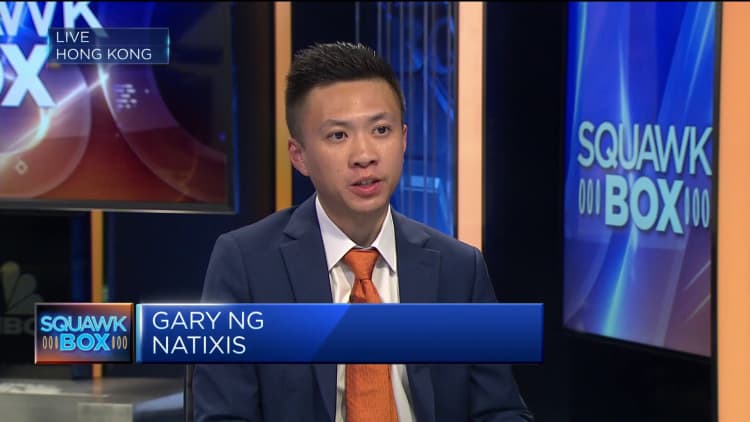Eric Hsu remembers a time when he was 10 days away from payday and had just $32 left. He had no savings.
“I used the remaining money I had to buy loaves of white bread and I ate that for all three meals until my pay came in,” he told CNBC Make It.
“Sometimes I would think, I am not earning little, I would actually think I’m earning an upper-middle income salary. But I still feel really poor every month.”
Hsu belongs to a group of people in Taiwan, typically young and single workers, called the “yue guang zu” — the so-called “moonlight clan.”
The term describes being broke at the end of each month, or as Hsu describes it, “Money comes in from my left hand and out from the right.”
This behavior is very different from their parents’, who literally saved every single cent they have.
Chung Chi Nien
Hong Kong Polytechnic University
The term originated from Taiwan but is now also frequently used in mainland China and Hong Kong to describe the younger generation, said Chung Chi Nien, a chair professor from Hong Kong Polytechnic University.
An estimated 40% of young singles who live in Beijing, Shanghai, Guangzhou, and Shenzhen are living paycheck to paycheck, according to a local report.
“This behavior is very different from their parents’, who literally saved every single cent they have. But the younger generation spends every single cent they have,” said Chung, who specializes in economic sociology.
The rising cost of living has put more individuals at risk of being in the “moonlight clan,” especially those with low income, said Chung.
While Taiwan’s inflation rate of 2.4% is much lower compared with many parts of the world, consumer prices and food costs are still on the rise.
For 34-year-old A-Jin, fixed expenses like insurance, utilities and transportation already take up “more than half” of her salary of 30,000 New Taiwan dollars (about $985) a month, she told CNBC Make It.
“I’d be left with NT$10,000 a month for food and other expenses. Eating out now costs around NT$300 a day. There is no way to save,” said A-Jin, who works in the service industry.
“If an emergency happens to me, like a car accident — I would not have any cash to deal with it.”
Not just inflation
But for some others, it’s the “you only live once” mentality that’s encouraging them to spend what they can — even if it means taking on debt.
Ever since Hsu started working 10 years ago, the civil engineer struggled to accumulate any savings because he was trying to pay off his student debts.
“Instead of saving leftover money I had at the end of the month, I decided to pay off my debts instead,” according to CNBC’s translation of his Mandarin comments.
I did let it get out of hand and was like, since I have a credit card, let’s purchase a car while I have it.
But when a serious knee injury took him out of work for two weeks without pay, Hsu realized he was unable to support himself.
“I thought, since I can use a credit card to pay for things and make my life easier, why not?”
But before he knew it, he had as many as four credit cards and almost 70% of his salary each month was going into paying off such debts — leaving little left to save.
Hsu acknowledged that while half his debt was for necessary daily expenses, the other half was incurred because of his “lifestyle choices and desires.”

“I did let it get out of hand and was like, ‘since I have a credit card, let’s purchase a car while I have it,'” 38-year-old Hsu said.
“With online shopping, you also get exposed to a plethora of things you can buy and the fact that you can make purchases so easily did not help.”
‘Small, but very certain happiness’
The concept of “moonlight clan” reflects the disillusionment that young people feel about life these days, said Chung, the professor. It’s much like other terms that have gained popularity in China in the past two years, such as “tang ping” and “bai lan.”
“In the context of East Asia, the moonlight clan’s parents have experienced very successful industrialization and fulfilled their goals in their lives,” he added.
“But that is a different reality for this generation … they see the success of their parents, but simply cannot achieve it. There’s a huge gap between expectation and reality.”
The “moonlight clan” exists mainly because house ownership is no longer attainable for the young in Taiwan — thanks to the lack of affordable housing, said Chung.
It could be anything from buying a cup of coffee from Starbucks, to going on an overseas trip — things that will give you a small sense of happiness to compensate for the loss of an overall goal in life.
Chung Chi Nien
Professor, Hong Kong Polytechnic University
According to the U.N. Habitat, housing is considered affordable when the house-price-to-income ratio is 3.0 or less.
In comparison, Taiwan’s current ratio is 9.6 and 15.7 in Taipei city, according to its Ministry of the Interior.
“The expectation to buy your own house, get married and build your own family is now way too far to reach,” Chung said.
“Young people would rather give up that dream and spend money on things they are guaranteed to get today.”
These things are called “xiao que xin” — which means “small, but very certain happiness” in Mandarin.
“It could be anything from buying a cup of coffee from Starbucks, to going on an overseas trip — things that will give you a small sense of happiness to compensate for the loss of an overall goal in life,” Chung told CNBC Make It.

Hsu agreed, sharing a common saying in Taiwan that describes the current state of affairs: “Houses are not for living, but for investing.”
“A three-bedroom now costs NT$20 million. How long do I need to save with my annual salary of NT$720,000?”
“You would only be serious about doing something if you have a strong goal. Without the possibility of buying a home, it’s like, ‘There’s no point making money if you don’t spend it,'” he added.
No long-term goals
A-Jin said she has no long-term financial or life goals and has “completely given up” on buying her own home.
“As long as I have food to eat and my stomach can be full, I won’t die. That’s enough for me,” she said.
“Since everything else is impossible, I just think of how I can be kinder to myself, that’s all.”
For Hsu, he considers the toughest days to be behind him. After his experience, he canceled his credit cards two years ago and committed to saving one third of his salary each month.
To not know whether you have enough money for food until the next payday was a very scary state to be in — but that was my own doing and the punishment fits the crime.
However, he still considers himself part of the “moonlight clan” because he remains uncertain about whether he’d survive another emergency.
“I still have no long-term financial goals … My priority is to clear the remainder of my credit card debts. I am solely driven by the fear of going hungry again,” he said.
“To not know whether you have enough money for food until the next payday was a very scary state to be in — but that was my own doing and the punishment fits the crime.”
Don’t miss: Think it’s too late to switch jobs? Tell that to ‘Asia’s best female chef’
Like this story? Subscribe to CNBC Make It on YouTube!

